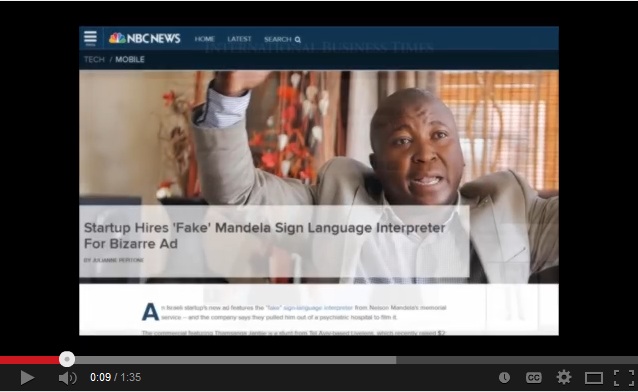 From time to time interpreters confide in each other about a job that has gone terribly wrong. From time to time, we find ourselves completely overwhelmed, unable to keep up with the speaker, and at a loss for words or signs. If it happens too often, we question whether we should be interpreters at all. We console ourselves and each other by saying that if we never find ourselves challenged by a job, then we’re probably not stretching ourselves enough, not enhancing our skills or our capacity to master more complicated and difficult interpreting experiences. And while it’s necessary for interpreters to take risks and do the jobs that scare us a little, it is sometimes accomplished at the expense of our consumers. For although we should make every effort to grow and hone our skills, we never want to block their access in order to give ourselves a chance to do something challenging and new.
From time to time interpreters confide in each other about a job that has gone terribly wrong. From time to time, we find ourselves completely overwhelmed, unable to keep up with the speaker, and at a loss for words or signs. If it happens too often, we question whether we should be interpreters at all. We console ourselves and each other by saying that if we never find ourselves challenged by a job, then we’re probably not stretching ourselves enough, not enhancing our skills or our capacity to master more complicated and difficult interpreting experiences. And while it’s necessary for interpreters to take risks and do the jobs that scare us a little, it is sometimes accomplished at the expense of our consumers. For although we should make every effort to grow and hone our skills, we never want to block their access in order to give ourselves a chance to do something challenging and new.
How, then, to reconcile both points of view? Deaf people need interpreters to become more highly skilled. Deaf professionals need interpreters capable of voicing their presentations at professional conferences; Deaf diplomats need interpreters able to interpret conversations with foreign heads of state; Deaf concert goers need interpreters willing to stand on stage at Madison Square Garden and interpret rap lyrics. None of these jobs is easy, and no interpreter graduates from her ITP ready to take them on. The highly trained interpreters who provide this specialized work build their skills over time, by taking increasingly difficult and high-pressure assignments. And it’s safe to say that on the way they occasionally failed to keep up with the speaker, or understand the content, or grasp the protocol expected in highly formal situations.
Doing one type of job exclusively will lead to an atrophy of your skills and limit your ability to explore new realms of interpreting. Yet, accepting work well above your abilities is not only a recipe for failure and a disservice to your consumers, it is also prohibited by the RID/NAD Code of Professional Conduct. Consider, then, taking jobs that challenge you in only one of the many variables involved. Maybe you’re asked to interpret a PhD-level philosophy class for a Deaf student. You have never interpreted such complex academic information before, but you know the Deaf student and understand his signing, you know your team and trust her skills, and you are assured the agency will provide you with the syllabus and other materials to help you prepare. You may be nervous about the academic language and complicated content you will face, but every other variable is in place to provide a safety net if you become overwhelmed. The added benefit that you can prepare before each class and become familiar with vocabulary and names that may come up makes this a good job to stretch your skills.
You’re asked to interpret for a Deaf presenter lecturing at a public event. You’ve voiced for Deaf presenters before, but never to a full auditorium using a microphone. As it may be quite possible that you will not be able to stop the presenter if you get lost, one compensatory strategy is already out the window. Possible solutions? Ask the presenter to meet with you beforehand to practice, and to send you a copy of the presentation early enough for you to review it and to research how to pronounce technical words with which you may not be familiar. Also, make every effort to secure a team whom you know to be a strong voicer, which will compensate for not being able to stop the speaker if you miss a word or phrase.
There are many ways to address the risk of interpreting new content, or for a new person, or in a new setting that would allow you enough of a safety net to comply with the CPC. There are, however, some reasons interpreters accept challenging jobs that do not justify the risk. One reason is the money. Do not take a difficult job because the money is just too good to pass up. If you don’t feel you will have the back up you need and the appropriate supports in place to help you succeed, no amount of money is worth failing your consumers. Likewise, if the job does not pay at all, don’t make the mistake of thinking, “It’s a volunteer job, so it’s okay if I mess it up. Having me is still better than having no interpreter at all.” Every consumer deserves a qualified interpreter, regardless of how much the job pays.
High profile jobs are always tempting. But don’t be enticed by a job just because it is high profile. Yes, it would be cool to interpret on stage or on TV for a famous actor, politician or well-known member of the Deaf community, but jobs with high visibility also invite public criticism. Remember that the job does not end with the presentation; your performance may end up on someone’s cell phone or video and go viral, leading to widespread comments and critiques. In addition, technical issues like lighting and staging may make it impossible to follow a script, stop the speaker or even see your team for a feed. Do not take a risk when several of your supports are unavailable.
This may seem counterintuitive, but don’t take a challenging job simply because you like the consumer, or your team. Liking the people you work with is a definite plus and can make a difficult job easier, but merely liking the consumer as an individual doesn’t mean you’re the best interpreter for her dissertation defense, or court appearance. You may get along well with certain interpreters, but if they don’t have the requisite skills for a specific job, you are missing a key variable that can help you successfully provide access. It’s more important to work with someone who has the technical vocabulary required, than to work with someone you enjoy hanging out with.
Of course, even the most prepared interpreter can get caught off guard. Once, I stated clearly to the institution hiring me that my accepting the voicing job was contingent upon getting the Deaf presenter’s PowerPoint well in advance of the event. After asking for it two week prior, one week prior, and then two days prior, the presenter still refused to send me a copy of her presentation. On another voicing assignment for a public event, the presenter promised to meet with my team two hours before the presentation. He ended up giving us less than a half hour of his time, time we also needed to spend reading through his slides for the first time.
You cannot predict everything that can go wrong with an assignment — a teacher with a strong accent; a doctor who refuses to speak directly to his Deaf patient; a Deaf consumer with limited vision. We can, however, prepare as much as possible, trust our training and our team, and learn from each catastrophic or less than perfect experience. And by honestly assessing our performance, we learn to differentiate between a challenge worth taking and a risk that should be avoided.









